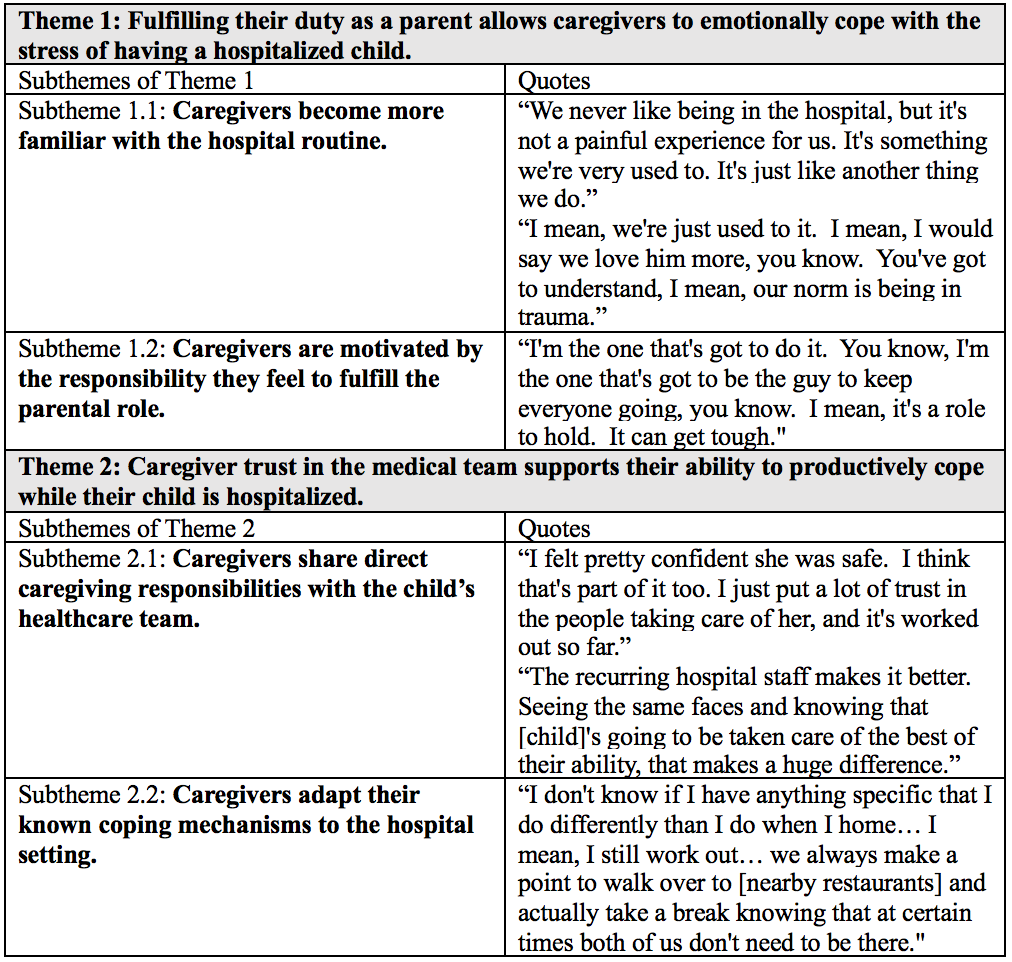Children with Chronic Conditions
Category: Abstract Submission
Children with Chronic Conditions III
589 - A Qualitative Study to Identify Key Factors that Aid Coping of Caregivers of Children with Neurodevelopmental Disabilities while Hospitalized
Monday, April 25, 2022
3:30 PM - 6:00 PM US MT
Poster Number: 589
Publication Number: 589.403
Publication Number: 589.403
Kathleen Krieg, University of Rochester School of Medicine and Dentistry, Rochester, NY, United States; Reza Yousefi Nooraie, University of Rochester, Rochester, NY, United States; Dennis Z. Kuo, University at Buffalo, Buffalo, NY, United States; Jill Halterman, University of Rochester School of Medicine and Dentistry, Rochester, NY, United States; Christie L. Petrenko, Mt. Hope Family Center, University of Rochester, Rochester, NY, United States; Nathaniel D. Bayer, Golisano Children's Hospital at The University of Rochester Medical Center, Rochester, NY, United States

Kathleen D. Krieg, BA (she/her/hers)
Medical Student
University of Rochester School of Medicine and Dentistry
Rochester, New York, United States
Presenting Author(s)
Background: Children with Neurodevelopmental Disabilities (NDD) are a medically complex subset of children who frequently require healthcare services. When these children are hospitalized, their caregivers often experience heightened stress, anxiety, and depression.
Objective: To identify foundational factors that allow caregivers of children with NDD to cope with the stressors associated with their child’s hospitalization.
Design/Methods: This analysis is part of a larger qualitative study examining family adjustment. Patients were identified from the complex care service at a single institution. Their caregivers were included if their child’s diagnoses fit one of the diagnostic codes for neurological impairment as identified by the International Classification of Diseases, 9th Revision. Purposive sampling was used to recruit a racially and ethnically diverse cohort. We performed semi-structured interviews over a video-conferencing platform to examine factors that facilitate caregiver coping. We audio-recorded, transcribed, and coded the interviews for main themes using the MAXQDA software. Process and in vivo codes were assigned to the transcripts through open coding and discussion among study team members. We conducted interpretive analysis to identify themes which were confirmed through group consensus using a grounded theory approach. We performed interviews until thematic saturation was reached.
Results: We interviewed 13 caregivers (Table 1) and identified two major themes (Table 2) of factors that facilitate caregiver coping. Theme 1: Fulfilling their role as a parent allows caregivers to emotionally cope with the stress of having a hospitalized child. Theme 2: Caregiver trust in the medical team supports their ability to productively cope while their child is hospitalized.Conclusion(s): Key processes that facilitate caregiver coping are becoming more familiar with the hospital routine and trusting in their child’s healthcare team to take good care of their child. Our results suggest ways that hospitals can better support caregivers while their children are hospitalized. Interventions to improve caregiver coping could focus on helping parents adapt to the hospital routine, building trust between the caregiver and the child’s healthcare team, and helping caregivers adapt their known coping mechanisms to the hospital setting.
Krieg CVKrieg CV for PAS.pdf
Table 2 Themes from qualitative analysis of interviews.
Themes from qualitative analysis of interviews.
Objective: To identify foundational factors that allow caregivers of children with NDD to cope with the stressors associated with their child’s hospitalization.
Design/Methods: This analysis is part of a larger qualitative study examining family adjustment. Patients were identified from the complex care service at a single institution. Their caregivers were included if their child’s diagnoses fit one of the diagnostic codes for neurological impairment as identified by the International Classification of Diseases, 9th Revision. Purposive sampling was used to recruit a racially and ethnically diverse cohort. We performed semi-structured interviews over a video-conferencing platform to examine factors that facilitate caregiver coping. We audio-recorded, transcribed, and coded the interviews for main themes using the MAXQDA software. Process and in vivo codes were assigned to the transcripts through open coding and discussion among study team members. We conducted interpretive analysis to identify themes which were confirmed through group consensus using a grounded theory approach. We performed interviews until thematic saturation was reached.
Results: We interviewed 13 caregivers (Table 1) and identified two major themes (Table 2) of factors that facilitate caregiver coping. Theme 1: Fulfilling their role as a parent allows caregivers to emotionally cope with the stress of having a hospitalized child. Theme 2: Caregiver trust in the medical team supports their ability to productively cope while their child is hospitalized.Conclusion(s): Key processes that facilitate caregiver coping are becoming more familiar with the hospital routine and trusting in their child’s healthcare team to take good care of their child. Our results suggest ways that hospitals can better support caregivers while their children are hospitalized. Interventions to improve caregiver coping could focus on helping parents adapt to the hospital routine, building trust between the caregiver and the child’s healthcare team, and helping caregivers adapt their known coping mechanisms to the hospital setting.
Krieg CVKrieg CV for PAS.pdf
Table 2
 Themes from qualitative analysis of interviews.
Themes from qualitative analysis of interviews.